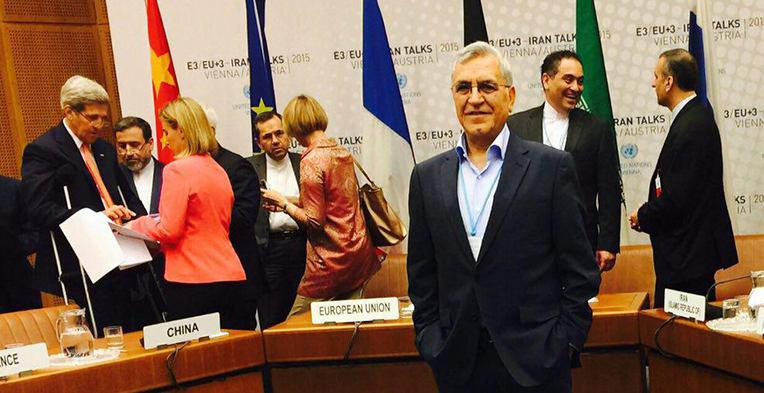PHOTO: Abdolrasoul Dorri Esfahani at Iran’s nuclear negotiations with the 5+1 Powers
LATEST
- Iran Belatedly Criticizes Turkish Intervention in Syria
- Top Official Tries to Repair Damage from Russian Use of Airbase
Iran’s regime has arrested one of its nuclear negotiators as part of a series of detentions of dual-national citizens.
Tehran’s Chief Prosecutor, Abbas Jafari Doulatabadi, said on August 16 that a suspect faced espionage charges, but the identity of Abdolrasoul Dorri Esfahani, an Iranian-Canadian national, was not revealed until Tuesday.
Former MP Hamid Rasaei said that Esfahani, “responsible for an important committee of the negotiating team” as a representative of the Central Bank, had received “a monthly salary of $35 million” from English and American entities. The website Nasim Online claimed the large remuneration was for transfer of “sensitive financial and economic information about the Islamic Republic”.
Esfahani had been named on June 20 by a hardline website as a supposed British spy, with the demand that the Intelligence Ministry answer questions about his role in the negotiations that culminated in an agreement in July 2015. Days later, he resigned from the board of directors of Saman Bank, following recommendations from the Central Bank.
Pars News website said on Wednesday that Esfahani had been “released after a few hours of interrogations” and is currently under surveillance while his case is investigated.
Esfahani holds a master’s degree in accounting from a UK-based university and is a member of the Institute of Chartered Accountants in England and Wales, the Chartered Professional Accountants of Ontario in Canada, and the Iranian Institute of Certified Accountants.
In February, after the official implementation of the nuclear agreement, President Rouhani commended Esfahani for his work and presented him with 50 gold coins.
A Marker of Regime In-Fighting
Esfahani’s arrest is part of a series of detentions of dual nationals by the Revolutionary Guards and judiciary, including Iranian-American oil executive Siamak Namaki and his 80-year-old father and the Anglo-Iranian charity worker Nazanin Zaghari-Ratcliffe.
It also appears to be part of a building campaign by hardline factions within the regime against President Rouhani.
Critics said Esfahani was appointed in 2013 as an advisor to the Governor of the Central Bank without stringent checks. They said he was working with “a brother” — a reference to Hassan Rouhani’s brother Hossein Fereydoun, who has been accused of corruption by hardliners.
The campaign has also included warnings to other former members of the nuclear negotiations teams since 2003. Cyrus Naseri was effectively told not to return to Iran, amid claims that a warrant had been issued for his warrant. Hossein Mousavian was briefly barred from leaving the country, until Speaker of Parliament Ali Larijani intervened.
In a sign that Rouhani and his allies might fight back, Deputy Foreign Minister Abbas Araqchi — the senior nuclear negotiator in the final stages of the talks with the 5+1 Powers — said, “If a spy was arrested or not, I think that the Judiciary and the institutions involved in this matter should explain.”
Iran Belatedly Criticizes Turkish Intervention in Syria
After initial hesitation, Iran has criticized Turkey’s intervention alongside rebels in northern Syria.
Apparently caught by surprise, Tehran’s officials did not comment as the rebels — backed by Turkish tanks and special forces — captured the ISIS-held border town of Jarablus on Wednesday.
On Thursday, Foreign Ministry spokesman Bahran Qassemi put out a line echoing that of the Assad regime:
The Islamic Republic of Iran has repeatedly declared that the fight against terrorist groups on Syrian soil must take place in coordination with the central government, and must respect the country’s sovereignty and territorial integrity as a fundamental principle of the international law.
We have always underlined that the fight against terrorism is an international obligation, and regional states need to combat this ominous phenomenon through joint cooperation.
Iran has been trying to woo Turkish President Recep Tayyip Erdoğan away from support for Syria’s opposition and rebels, offering him full support after a failed coup in Ankara on July 15. Foreign Minister Mohammad Javad Zarif was in the Turkish capital last week for discussions.
Top Official Tries to Repair Damage from Russian Use of Airbase
A top Iranian official has tried to repair the damage from fallout over Russia’s use of an airbase in western Iran.
Ali Shamkhani, the Secretary of the National Security Council, insisted that “strategic relations” with Moscow have not ended despite Iran’s termination of an agreement for Russian bombers to fly from Hamedan base for missions across northern Syria.
After Russia announced the first missions on August 16, Shamkhani hailed Iranian-Russian “strategic cooperation”. However, some Iranian MPs said the flights violated the Islamic Republic’s Constitution, which prohibits the deployment of foreign military personnel inside Iran. Defense Minister Hossein Dehghan then accused the Russians of being “ungentlemanly” in their declarations, but was in turn reprimanded by the Supreme Leader for his language.
Shamkhani told Russia’s RT Arabic that Russian use of the base was a “temporary agreement” which had now ended:
Fighting terrorism requires an exchange of capabilities in different fields. The recent operation was carried out in cooperation with Iran’s military advisors, Russian air support and an effective participation of the Syrian army on the ground.
This operation required that some of Iran’s capabilities are employed for a definite and limited period of time. The application of these capabilities was done at Hamadan airbase and concluded.
He repeated his invocation of a “strategic relationship” and said, “The resumption of this type of cooperation in the future depends on the field developments in Syria; hence, it is possible to cooperate with Russia in this field again.”

